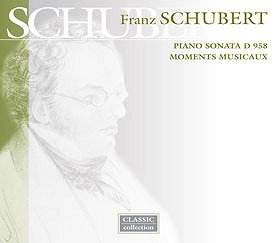Any present-day interpretation of the C minor,
one of three great piano sonatas composed in the year of his death,
faces formidable competition from Brendel, Schiff and other notable
recordings. Beethoven’s influence is unmistakable in the opening
– an impetuous Allegro. If this restless energy is allowed
to flag the result can be ponderous rather than inspiring, which
effectively is what happens here. No change of tempo is indicated
for the songful second subject, but again Nauta loses impetus.
Thereafter things get much better. The Adagio, a curiously ambivalent
movement, swings between calm resignation and agitated despair.
Nauta handles the unexpected sfortzandos in the repeated chords
with considerable dramatic effect, and plays the hushed, hesitant
ending beautifully. The waltz-like Minuet returns to happier fields
and the final movement unfolds with, at first, not a care in the
world -- a playful 6/8 canter accompanied by dainty triplets
that benefits from being played for detail rather than speed as
it is on this disc. This may well be one of the most personal
movements in all Schubert’s piano sonatas. Its sunny nonchalance
seems undisturbed until shadows begin to gather, with dotted rhythms,
sudden modulations, abrupt dynamic changes and fragmented phrases.
The cheerful tune has turned into a danse macabre and ends with
two stark chords.
Moments Musicaux was written a year before
the sonata while Schubert was completing his last song cycle Winterreise
(the so-called Schwanengesang being a posthumous collection
sewn together by a publisher) and is therefore also a late work.
It has been suggested that Schubert was aiming to supply amateur
pianists with more nourishing fare than the Ländler, ecossaises
and waltzes that underpinned his wider popularity. If so they
would need to be accomplished pianists, for several of the Moments
are technically challenging. The bleakness of Winterreise
is replaced by short, deceptively innocent-sounding pieces
that make a satisfying whole when all six are played consecutively,
as they were at the first performance in Vienna. Schiff’s and
Nauta’s timings (30.34 and 29.37 respectively) are roughly the
same and, though the piano sound is more penetrating, and therefore
less satisfactory. This is a heart-warming interpretation of what,
with the exception of ambitious amateurs, is an unjustly neglected
demonstration of Schubert’s gifts as a miniaturist.
No booklet and, as usual with Classic Collection,
sparse details about either the performer or the music itself,
but; at a bargain price, an interesting addition to any Schubert
collection.
Roy Brewer
